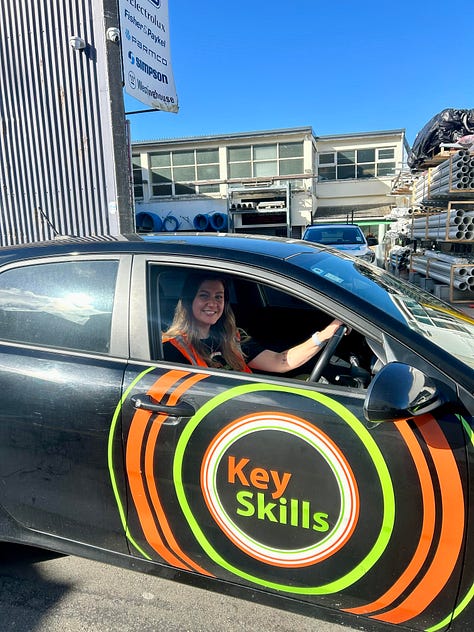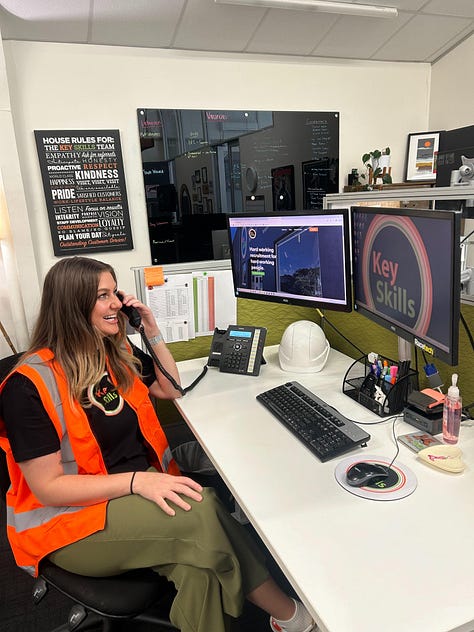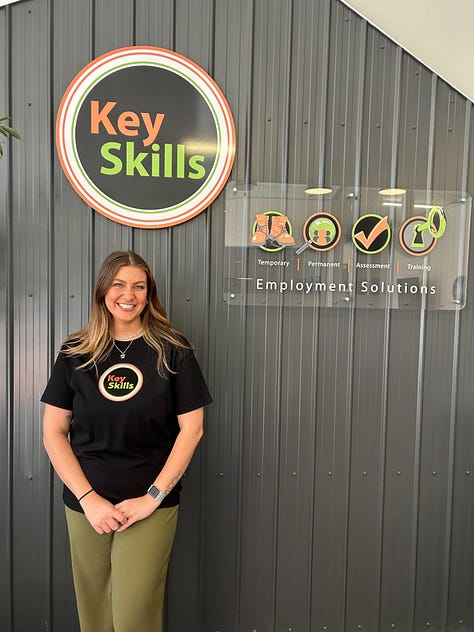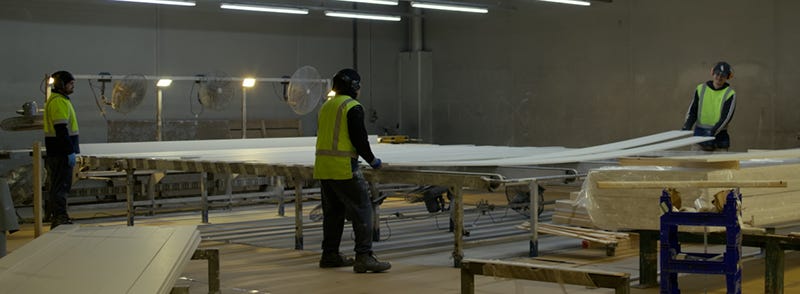Wellington Hire Wire - Issue four
Hello from Ailsa and Beccy!
This month we’re welcoming Ally Jones to the team. She’s joining Josh in the construction crew and has hit the ground running. Ally has had her fair share of hands-on construction experience, having worked as a Labourer for her dad's construction company. She has an English Literature degree (like Josh) so you can expect some wordy texts! With practical experience and a calm, people-focused approach, she’s already making an impact. You can get to know her a bit more in the spotlight Q&A.
We’re also saying goodbye to Bailey, who’s off to start a new chapter in London. Bailey’s been a steady, reliable presence and his work has made a real difference for us and our clients. We’ll miss him and wish him all the best for what’s next.
In this issue:
- A Q&A with Ally after her first week on the job
- Budget 2025
- A closer look at how A.I. is improving workplace safety
- Tips for keeping your crew moving safely through winter
- What hiring mistakes really cost, and how to avoid them
As always, thanks for being part of our crew.
Ailsa & Beccy


Got something to add? A trend you’re seeing on site or in the office? We’d love to hear it. Send it through to wellingtonhirewire@substack.com.
Welcome to Ally Jones!
She’s only one week in, but Ally is already bringing serious insight and energy to her new role as a recruiter at Key Skills. With firsthand experience on building sites and a natural instinct for people, she’s set to make waves. Read her thoughts after week one at Key Skills.



What did day one look like for you?
Getting set up, shown the ropes, meeting the team and experiencing a typical workday, which also included a few of the not-so-typical curveballs.
What surprised you the most after your first week as a recruiter?
How quickly things can ebb and flow. One moment it’s quiet and manageable, the next it’s full-on. It’s preparing me well for what’s ahead.
How has your family background in construction helped you with the work?
I’ve spent time working on building sites, and how to work alongside tradies. That background helps me match people with the right sites and teams.
What was the best thing that happened this week?
Getting out of the office for site visits and meeting clients and candidates in person to start building those relationships early.
What’s something you’ve already learned that will stick with you?
Josh told me, “Don’t worry about the little mistakes in the beginning - it’s about time in the saddle. Pick your battles and keep pushing. Face challenges head-on, ask questions, and take every moment as a learning opportunity.” That really landed with me.
What are you excited to get better at?
Sharpening my people skills and getting more confident thinking on my feet when things don’t go to plan.
Any stand-out advice you’ve been given already?
Just get stuck in. Learn by doing, and lean on the support of the team, that’s what they’re here for.
How would you describe Key Skills to your friends and family?
We have a fantastic team environment that operates to a consistently high standard. We support each other and the wider workforce every step of the way.
Budget 25 - May 22nd
The Government’s Budget is due soon, and while there haven’t been any clear signals that major changes are coming for recruitment or labour hire, we’ll be watching closely. Budgets can sometimes shift the dial on training subsidies, immigration settings, or infrastructure funding - all of which can influence the pace and shape of hiring across the country.
Even small changes, like tightening access to funding for apprenticeships or pausing regional development projects, can have knock-on effects for short-term roles.
After a morning of media lock-up, the news of the budget usually starts emerging around 2pm. As always, we’ll keep across it and share anything that looks likely to impact how our clients and candidates work. Follow us on Facebook for our takes straight from the news reports.

How AI is helping keep timber workers safe
Artificial intelligence might sound like something out of the tech world, but it’s already being used to prevent injuries on worksites in New Zealand.
At Niagara Sawmilling in Southland, a new AI system was trialled to monitor how workers interact with machinery. The goal wasn’t to watch people for the sake of it. It was to spot risky behaviour early and help workers avoid serious harm.
The system, developed by SeeChange Technologies, alerts workers and supervisors in real time if something looks unsafe. For example, reaching into a machine without following the proper shutdown process would trigger an alert. It also tracks trends over time so that training or process changes can be made before something goes wrong.
The results were hard to ignore. Over 12 months, unsafe actions dropped by 77 per cent. According to WorkSafe, workers' feedback was positive. It helped them feel more aware of what they were doing and more confident on the job.
James Fletcher from WorkSafe said it’s not about replacing people with machines, but about helping them make better decisions in the moment.
While this trial was in a timber yard, the potential for construction and manufacturing is clear. Real-time data could soon be part of how we all manage health and safety, especially in high-risk roles.
Source: WorkSafe NZ – AI game changer for timber manufacturing
Keeping it moving in winter
We’ve had some wild weather recently, and as winter creeps in, it’s not just the cold affecting our mood. The stiffness, the slower starts, the foggy mornings where boots are damp and cold fingers don’t quite grip like they should. Staying well throughout the season is so important, and we’re sharing a few simple ways to help your team stay safe and well on site. From quick warm-ups to overlooked gear checks, these are the quiet habits that help people get through winter in one piece
The real cost of a hiring mistake (and how to avoid one)
When a new hire doesn’t work out, it’s not just a bit frustrating. It costs time, energy, and usually puts extra pressure on the team. There’s the money spent on getting someone started, the hours lost in training, and the disruption that comes with trying to fill the same role all over again.
In this issue, we’re talking about what hiring mistakes really cost, and why they sometimes slip through even when you think you’ve done everything right. We’ve also included a few ways to lower the risk next time around. Things like asking better questions, trusting your gut, and using your recruiter as a sounding board before a small concern becomes a big problem.
If you’re doing most of the hiring yourself but want a bit of extra support, our Pick 'n' Mix recruitment offer might be a good fit. It’s flexible, and you can use as much or as little help as you need.

Need hiring support? Key Skills is here to help - let’s talk.



